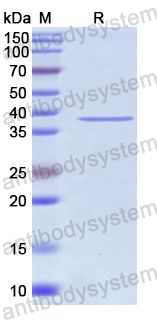Catalog No.
YHJ80501
Expression system
E. coli
Species
Homo sapiens (Human)
Protein length
Val171-Arg284
Predicted molecular weight
38.95 kDa
Nature
Recombinant
Endotoxin level
Please contact with the lab for this information.
Purity
>90% as determined by SDS-PAGE.
Accession
Q9ULV5
Applications
ELISA, Immunogen, SDS-PAGE, WB, Bioactivity testing in progress
Form
Lyophilized
Storage buffer
Lyophilized from a solution in PBS pH 7.4, 0.02% NLS, 1mM EDTA, 4% Trehalose, 1% Mannitol.
Reconstitution
Reconstitute in sterile water for a stock solution. A copy of datasheet will be provided with the products, please refer to it for details.
Shipping
In general, proteins are provided as lyophilized powder/frozen liquid. They are shipped out with dry ice/blue ice unless customers require otherwise.
Stability and Storage
Use a manual defrost freezer and avoid repeated freeze thaw cycles. Store at 2 to 8°C for frequent use. Store at -20 to -80°C for twelve months from the date of receipt.
Alternative Names
Heat shock factor protein 4, Heat shock transcription factor 4, HSF4, HSTF 4, HSF 4, hHSF4
Deficiency of HSF4 Increases the Secretion of Small Extracellular Vesicles via Upregulation of Chaperone-Mediated Autophagy., PMID:40211689
Genetic mutation in HSF4 is associated with retinal degeneration in mice., PMID:40023307
Targeting Heat Shock Transcription Factor 4 Enhances the Efficacy of Cabozantinib and Immune Checkpoint Inhibitors in Renal Cell Carcinoma., PMID:40004241
Crosstalk between signaling pathways (Rho/ROCK, TGF-β and Wnt/β-Catenin Pathways/ PI3K-AKT-mTOR) in Cataract: A Mechanistic Exploration and therapeutic strategy., PMID:39965745
Feature gene selection and functional validation of SH3KBP1 in infantile hemangioma using machine learning., PMID:39955954
Extracellular matrix stiffness regulates colorectal cancer progression via HSF4., PMID:39881364
The heat shock factor code: Specifying a diversity of transcriptional regulatory programs broadly promoting stress resilience., PMID:39454718
Potential correlation between chronic periodontitis and Parkinson's disease., PMID:39049641
Molecular regulation of PPARγ/RXRα signaling by the novel cofactor ZFP407., PMID:38781157
Single-nucleus transcriptomics and chromatin accessibility analysis of musk gland development in Chinese forest musk deer (Moschus berezovskii)., PMID:38644525
The heat shock factor 20-HSF4-cellulose synthase A2 module regulates heat stress tolerance in maize., PMID:38573521
ZNF692 Promotes the Progression of Colon Adenocarcinoma by Regulating HSF4 Expression., PMID:38435777
miR-330-5p Suppress Cell Growth and Invasion via Disrupting HSF4-mediated MACC1/STAT3 Pathway in Colorectal Cancer., PMID:38420805
Screening Mutations of the Monogenic Syndromic High Myopia by Whole Exome Sequencing From MAGIC Project., PMID:38315492
Development and verification of a combined immune- and cancer-associated fibroblast related prognostic signature for colon adenocarcinoma., PMID:38312843
Plant-Derived Extracts Plus Vitamin E and/or Aloe Vera Protect Against Intrinsic/Extrinsic Stressor in Human Skin: In Vitro and Clinical Evidence., PMID:38179774
Association between heat shock factor protein 4 methylation and colorectal cancer risk and potential molecular mechanisms: A bioinformatics study., PMID:38173437
Allele and genotype frequencies for primary hereditary cataract, multifocal retinopathy 1, and degenerative myelopathy in Pyrenean Mountain dog from Italy., PMID:38081509
Eye Lens Organoids Made Simple: Characterization of a New Three-Dimensional Organoid Model for Lens Development and Pathology., PMID:37887322
Transcriptome analysis reveals molecular regulation mechanism of Tibet sheep tolerance to high altitude oxygen environment., PMID:37729444
Multiomic analysis implicates FOXO4 in genetic regulation of chick lens fiber cell differentiation., PMID:37722500
Eye lens organoids going simple: characterization of a new 3-dimensional organoid model for lens development and pathology., PMID:37503005
Loss of SYNCRIP unleashes APOBEC-driven mutagenesis, tumor heterogeneity, and AR-targeted therapy resistance in prostate cancer., PMID:37478850
HSF4/COIL complex-dependent R-loop mediates ultraviolet-induced inflammatory skin injury., PMID:37461263
HSF4 Transcriptionally Activates Autophagy by Regulating ATG9a During Lens Terminal Differentiation., PMID:37266953
Knockout of miR-184 in zebrafish leads to ocular abnormalities by elevating p21 levels., PMID:37086087
Transcriptomic profiles of the ruminal wall in Italian Mediterranean dairy buffaloes fed green forage., PMID:36941576
Transcriptomic analysis of the Non-Obstructive Azoospermia (NOA) to address gene expression regulation in human testis., PMID:36883778
Aquaporin 5 maintains lens transparency by regulating the lysosomal pathway using circRNA., PMID:36824022
Hyper-transcription of heat shock factors and heat shock proteins safeguard caprine cardiac cells against heat stress., PMID:36585073
Functional diversification of heat shock factors., PMID:36402935
Generation of Lens Progenitor Cells and Lentoid Bodies from Pluripotent Stem Cells: Novel Tools for Human Lens Development and Ocular Disease Etiology., PMID:36359912
HSF4 promotes tumor progression of colorectal cancer by transactivating c-MET., PMID:36229759
Pathogenic genetic variants identified in Australian families with paediatric cataract., PMID:36161833
Changes in DNA methylation hallmark alterations in chromatin accessibility and gene expression for eye lens differentiation., PMID:35246225
Biotin attenuates heat shock factor 4b transcriptional activity by lysine 444 biotinylation., PMID:35198740
FGD3 binds with HSF4 to suppress p65 expression and inhibit pancreatic cancer progression., PMID:34975151
The Role of Heat Shock Proteins in Cellular Homeostasis and Cell Survival., PMID:34725587
Determine genetic variations in heat shock factor gene family (HSFs) and study their effect on the functional and structural characterization of protein in Tali goat., PMID:34370605
Variants in PAX6, PITX3 and HSF4 causing autosomal dominant congenital cataracts., PMID:34345029
Deficiency of heat shock factor 4 promotes lens epithelial cell senescence through upregulating p21cip1 expression., PMID:34339841
The aging mouse lens transcriptome., PMID:34119483
Effect of Post-Hatch Heat-Treatment in Heat-Stressed Transylvanian Naked Neck Chicken., PMID:34072238
Molecular and Genetic Mechanism of Non-Syndromic Congenital Cataracts. Mutation Screening in Spanish Families., PMID:33923544
Differential expression of miRNAs and related mRNAs during heat stress in buffalo heifers., PMID:33863422
Organelle degradation in the lens by PLAAT phospholipases., PMID:33854238
More Than Meets the Eye: Revisiting the Roles of Heat Shock Factor 4 in Health and Diseases., PMID:33807297
A novel missense mutation in the HSF4 gene of giant pandas with senile congenital cataracts., PMID:33686159
Genome-Wide Analysis of Differentially Expressed miRNAs and Their Associated Regulatory Networks in Lenses Deficient for the Congenital Cataract-Linked Tudor Domain Containing Protein TDRD7., PMID:33665188
Impact of chronic hyperglycemia on Small Heat Shock Proteins in diabetic rat brain., PMID:33631184

